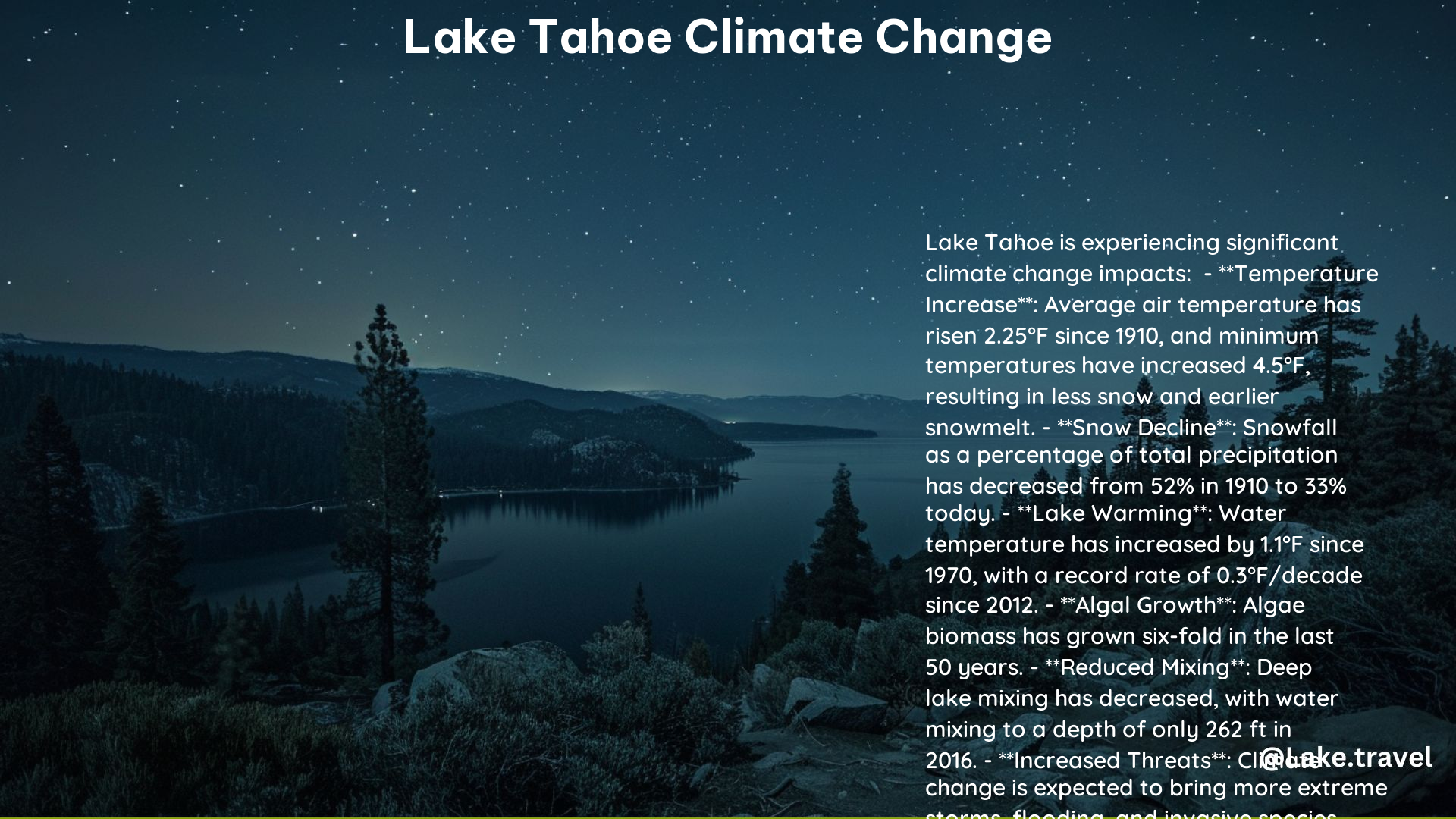Lake Tahoe, a renowned natural wonder nestled in the Sierra Nevada mountains, is facing significant challenges due to the impacts of climate change. As a Lakes Touring Enthusiast, it’s crucial to understand the specific ways in which this iconic destination is being affected, from rising temperatures and shifting precipitation patterns to declining water clarity and ecosystem disruptions.
Temperature and Precipitation Trends
The average air temperature in the Lake Tahoe Basin has risen by 2.25°F since 1910, with the minimum temperature increasing by an even more dramatic 4.5°F. This warming trend is projected to continue, with temperatures expected to rise by 4 to 9°F by the end of the century.
Alongside the temperature increase, climate change is also bringing more extreme weather events to the region. Precipitation patterns are becoming more erratic, with wetter wet years and drier dry years. This shift is already evident, with the fraction of precipitation falling as snow decreasing from 52% in 1910 to just 33% today.
Impacts on Water Clarity

One of the most visible and concerning impacts of climate change on Lake Tahoe is the decline in water clarity. Warmer water temperatures and decreased deep-water mixing are diminishing the lake’s renowned clarity. Additionally, larger and more frequent wildfires and floods are increasing sediment flows into the lake, further reducing its clarity.
Compounding the issue, climate change is also leading to increased algal growth due to warmer temperatures and changes in nutrient inputs. This can have a significant impact on the lake’s delicate ecosystem and its overall aesthetic appeal.
Ecosystem Disruptions
The effects of climate change on Lake Tahoe’s ecosystem are far-reaching and concerning. Larger and more frequent wildfires, as well as longer and more frequent droughts, are threatening the region’s $26.9 billion in property value and causing significant damage to the forest health.
Native species are also facing challenges, as reduced habitat due to climate change is causing some to decline or even become locally extinct. Warmer temperatures are also making the nearshore water more hospitable for aquatic invasive species, posing a threat to the lake’s delicate ecosystem.
Economic and Social Impacts
The impacts of climate change on Lake Tahoe extend beyond the natural environment, affecting the region’s $5 billion tourism-based economy. The ski industry, in particular, is projected to lose $268 million annually by 2100 due to shorter winter recreation seasons.
Climate change is also taking a toll on the region’s infrastructure and property. Annual road damages are expected to exceed $75 million by 2100, and each $1 million invested in climate adaptation projects will reduce property damage by $10 million.
Adaptation Strategies
In response to these alarming trends, various organizations and agencies are working together to develop climate change adaptation strategies for Lake Tahoe. The California Tahoe Conservancy, the Tahoe Regional Planning Agency, and the UC Davis Tahoe Environmental Research Center are leading the charge, implementing measures to mitigate the impacts of climate change and protect this natural wonder for generations to come.
As a Lakes Touring Enthusiast, it’s crucial to stay informed about the ongoing efforts to address the challenges facing Lake Tahoe. By understanding the specific ways in which climate change is impacting this iconic destination, we can better appreciate the importance of taking action and supporting the initiatives aimed at preserving its beauty and ecological integrity.
References:
– Impacts of Climate Change on Lake Tahoe
– Climate Change and Lake Tahoe
– Climate Resilience in Lake Tahoe
– How Climate Change is Affecting Lake Tahoe
– Climate Change Programs in Lake Tahoe
